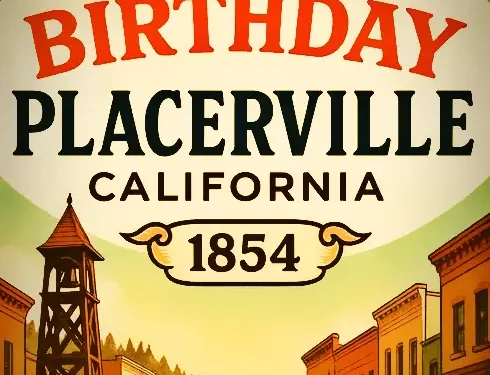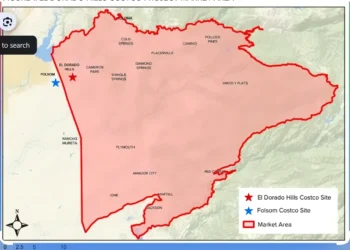By Cris Alarcon, InEDC Writer. (May 13, 2025)
May 13th, 1854 – May 13th, 2025
Today we celebrate 171 years since Placerville was officially incorporated as a city on May 13th, 1854. Known far and wide during the Gold Rush as “Hangtown,” Placerville quickly became a hub for miners, merchants, and pioneers chasing dreams of fortune in the Sierra Nevada foothills. By the time of its incorporation, it had already grown into one of the most bustling towns in the state—earning the title of California’s third-largest city at the time.
Placerville, California: Historical Timeline (mid-19th century)
- 1848: The California Gold Rush begins when James Marshall discovers gold at Sutter’s Mill on January 24, 1848. Prospectors swarm the Sierra foothills, and by summer 1848 roughly 1,000 miners are working a new camp on what will become Placerville. This mining settlement is initially nicknamed “Dry Diggins” (miners cart dry earth to water to pan for gold). The location soon serves as a major supply and rendezvous point for Mother Lode miners in the region.
- 1849: Vigilante justice earns the town the notorious nickname “Hangtown.” In early 1849 an impromptu citizens’ jury hanged three accused robbers from a giant oak tree in town, and more mob hangings follow. With no formal law enforcement, miners took the law into their own hands. The triple lynching on Main Street cements the grim name “Hangtown,” which endures through the Gold Rush era.
- 1850: California becomes a state (Sept. 9, 1850) and El Dorado County is created that year. Placerville lies in the new county (Coloma is initially the county seat). The town’s first post office opens in 185. Around this time local churches and temperance leagues begin agitating to replace the morbid “Hangtown” name – in fact, the name Placerville (honoring the rich placer gold deposits) is suggested as early as 1850
- 1854: On May 13, 1854 the community is officially incorporated as the City of Placerville. The new name (Spanish placer “sand deposit” + French ville “town”) honors the town’s gold mining roots. (That same year Placerville unsuccessfully petitions to move the El Dorado County seat from Coloma.) At incorporation, Placerville is California’s third-largest city, behind only San Francisco and Sacramento, reflecting its boomtown stature.
- 1856: On July 6, 1856 a disastrous fire nearly levels downtown Placerville. The mostly wooden buildings along Main Street burn rapidly, destroying many businesses and homes. The townspeople immediately rebuild, using more brick and stone to better resist future blazes.
- 1857: After two contested elections, the California legislature moves the county seat from Coloma to Placerville. This victory cements Placerville’s role as the regional center of El Dorado County (which it remains today).
- 1859: The Comstock Lode silver strike in Nevada (discovered in 1859) revives the local economy. Placerville becomes a key supply and transit hub for the silver fields: prospectors and freight caravans pass through town en route to the Comstock mines.
- 1859–1866: Placerville serves as the western terminus of the Overland Stage and mail routes across the Sierras. From 1859 to 1866 the Placerville–Carson Road (later U.S. Highway 50) is constructed. This period sees a peak era of stagecoach travel and freight traffic: thousands of horses, mules and wagons pass through Placerville carrying passengers and goods between California and Nevada’s mining districts.
- 1860: Placerville hosts a station of the Pony Express mail route. For the brief period of 1860–1861 the town is a vital link in the rapid cross-country mail service, connecting California’s mining towns to the rest of the country (until the telegraph and railroads make the Pony Express obsolete).
With its incorporation, Placerville became the 10th oldest incorporated city in the State of California, and it still proudly carries the legacy of its Gold Rush roots, historic Main Street, and enduring frontier spirit.
So here’s to our amazing little town—Placerville, heart of the Mother Lode and keeper of 171 years of wild, resilient, and golden history.
???? Happy Birthday, Placerville! Long may you thrive.










